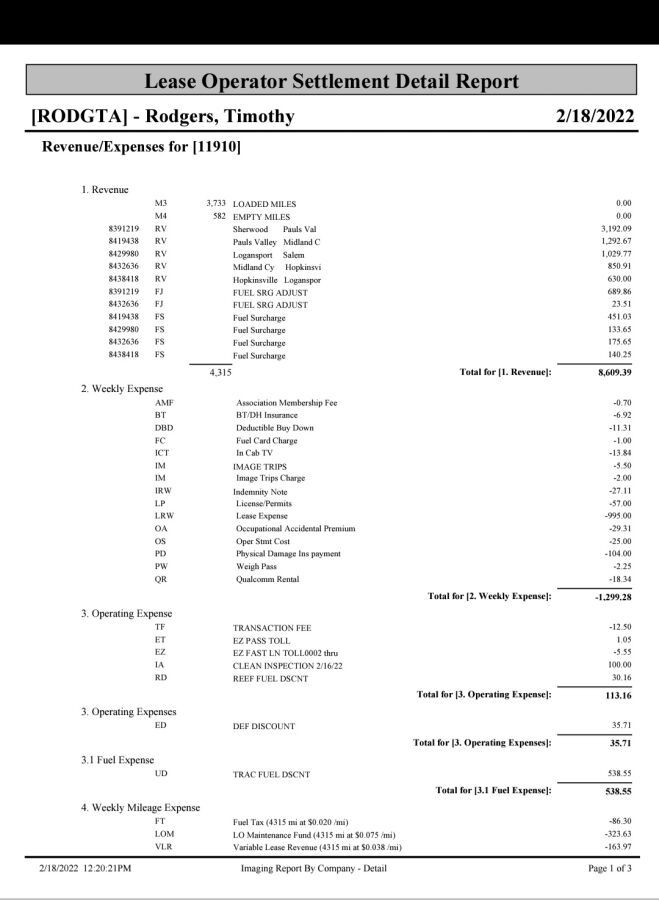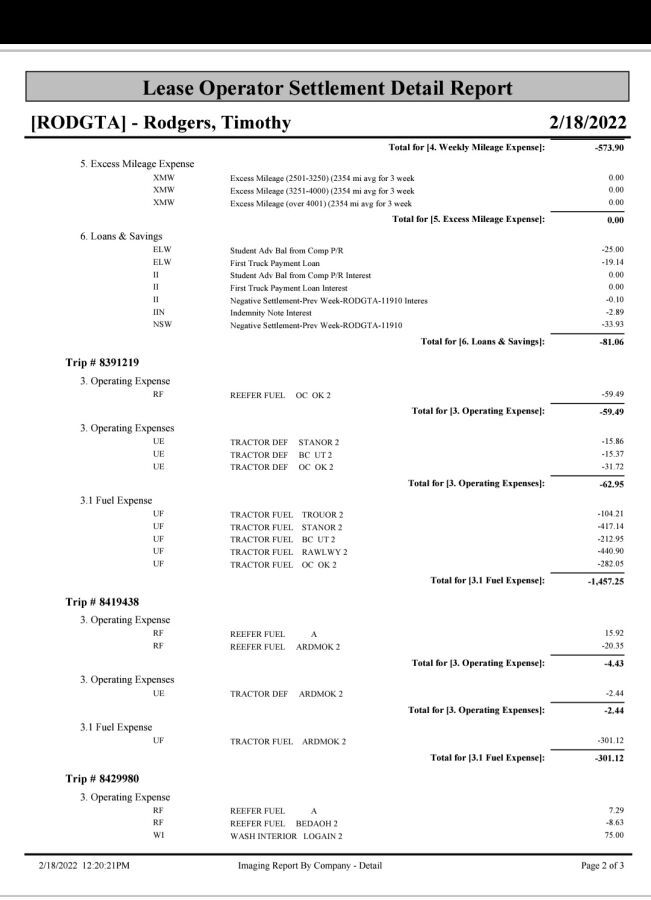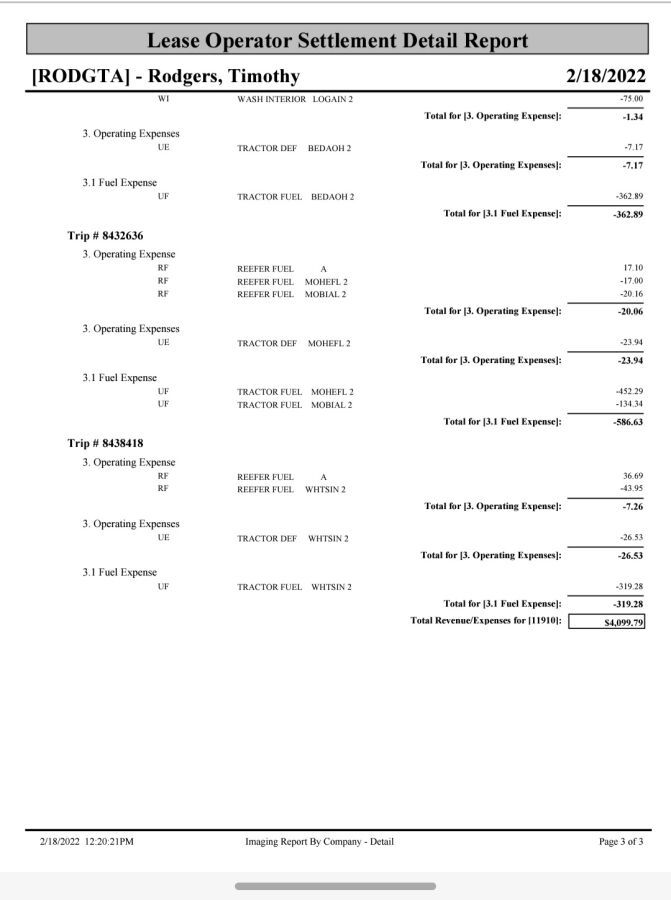Should A Rookie Driver Become A Lease Operator?
Topic 21644 | Page 5
And this is usually the response we get back from anyone that goes into the lease plan. I'd love to read all your numbers for all the costs and expenses compared to settlements. Some day a lease operator will post these, but after my six years on TT, it hasn't happened.
Good luck.
I’ve always been curious as to what Prime gives lease ops in regards to fuel surcharge because I can almost guarantee they’re skimming.
I don't know if they are or not but they definitely have some connections with discounts and all that. Last week I ran 4315 miles and after discounts only paid $1100 for fuel. I think the only reason I even paid that much is because of where I bought fuel a couple of times. I wasn't always where I could fuel at the places Prime suggested.
And this is usually the response we get back from anyone that goes into the lease plan. I'd love to read all your numbers for all the costs and expenses compared to settlements. Some day a lease operator will post these, but after my six years on TT, it hasn't happened.
Good luck.
I think these are in the right order... this is my statement from last week.



What is your maintenance cost per mile?
What is your fixed cost to operate the truck?
What is your percentage of loaded miles and deadhead miles?
How much are you setting aside for maintenance?
How much are you setting aside for quarterly taxes?
What is the fuel surcharge average since you started?
How much are you paying yourself per mile?
Are you performing any scheduled and unscheduled maintenance?
Do you have an accountant that is proficient with truckers needs?
Deadhead:
To drive with an empty trailer. After delivering your load you will deadhead to a shipper to pick up your next load.

Tim...
If L/O was as lucrative as you believe; we’d all be doing it. That net, before tax income, is not your take home. It’s revenue. Pay yourself a modest salary and you might remain solvent.
Good luck.
What is your maintenance cost per mile?
What is your fixed cost to operate the truck?
What is your percentage of loaded miles and deadhead miles?
How much are you setting aside for maintenance?
How much are you setting aside for quarterly taxes?
What is the fuel surcharge average since you started?
How much are you paying yourself per mile?
Are you performing any scheduled and unscheduled maintenance?
Do you have an accountant that is proficient with truckers needs?
These are all really good questions! Can you help me answer them??
Deadhead:
To drive with an empty trailer. After delivering your load you will deadhead to a shipper to pick up your next load.
Should he drive the truck for ya too? Don’t take that the wrong way Tim but your a l/o now. Those questions are things you are got my to have to figure out for yourself. Those are questions you should of had an idea of how to figure out before you jumped into ownership.
What is your maintenance cost per mile?
What is your fixed cost to operate the truck?
What is your percentage of loaded miles and deadhead miles?
How much are you setting aside for maintenance?
How much are you setting aside for quarterly taxes?
What is the fuel surcharge average since you started?
How much are you paying yourself per mile?
Are you performing any scheduled and unscheduled maintenance?
Do you have an accountant that is proficient with truckers needs?
These are all really good questions! Can you help me answer them??
Deadhead:
To drive with an empty trailer. After delivering your load you will deadhead to a shipper to pick up your next load.
HOS:
Hours Of Service
HOS refers to the logbook hours of service regulations.I came here on advice on how to be successful at something that I've already committed to, not to be scared and criticized for making the decision.
Hey Tim, you still came to the right place because most of the information on TT aimed at teaching rookie company drivers to be efficient and productive applies to you as a lease operator. And yes, you will encounter criticism of the L/O system because the experienced drivers here want other drivers to be aware of the pitfalls. So don’t take it personally. Stick around and ask questions and chime in with what you learn
I’ll just tackle one aspect of Tim’s post so he can realize how these larger companies get over on lease ops without them knowing it.
His total revenue for the week was $6995.44. The current National fuel surcharge is at 46% which means, he should have seen an extra of $3217.90 for fuel (psst, Prime kept it). His fuel bill for the week without counting. DEF was $1457.25 which means they ripped him off for $1760.65. Now that’s if they actually gave the FSC which they don’t. Instead, he paid $1100 for fuel.
OWI:
Operating While Intoxicated
New Reply:
New! Check out our help videos for a better understanding of our forum features

















Preview:
This topic has the following tags:
Prime Inc Wilson Logistics Advice For New Truck Drivers Leasing A Truck Owner Operator Truck Driver Salary







 TT On Facebook
TT On Facebook
I understand what everybody is saying and I get that I have to pay dues and that I won't make a ton of money since I'm just starting out. I'm not arguing that. I knew I would be at the bottom of the ladder. I knew that coming in to this industry. I'm not naive or young enough to think I would make a LOT of money off the bat but I do have a minimum amount I need in order to survive and pay my bills. My calculations were a little higher than 1000 a week or so which would be close to what I was making before I lost my last job. If I can't make that it will be a lot harder to survive and not worth the sacrifice I'm making to call this a career. So far as a lease op I think I'll be able to do that. All, and I mean ALL the other drivers I know at my company are lease ops. All the trainers, all the more senior drivers I know, all of them. They didn't push me to lease but talked it up enough to convince me it would be a lot better. Did I want to take that risk so early? Of course not! But if the money is drastically different I believe it will be worth it. So far it has been better. I won't always have a week like this past one but it is encouraging.
I came here on advice on how to be successful at something that I've already committed to, not to be scared and criticized for making the decision.
Dispatcher:
Dispatcher, Fleet Manager, Driver Manager
The primary person a driver communicates with at his/her company. A dispatcher can play many roles, depending on the company's structure. Dispatchers may assign freight, file requests for home time, relay messages between the driver and management, inform customer service of any delays, change appointment times, and report information to the load planners.